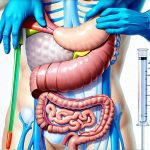Digestive procedures are often necessary for diagnosing and treating a wide range of gastrointestinal conditions, from minor discomforts to serious illnesses. These procedures can sometimes feel daunting, so understanding what to expect during recovery is vital for minimizing anxiety and promoting optimal healing. This article will provide a comprehensive overview of the typical recovery process following various digestive procedures, outlining potential symptoms, timelines, and essential self-care strategies. It’s important to remember that individual experiences may vary based on the specific procedure performed, your overall health, and any underlying medical conditions.
Navigating Digestive Procedure Recovery: A Comprehensive Guide
Recovery after a digestive procedure isn’t just about physical healing; it’s also about managing discomfort, recognizing potential complications, and gradually returning to normal activities. The duration and intensity of recovery differ significantly depending on the type of procedure undergone – from minimally invasive endoscopies to more complex surgeries like colectomies. This guide will cover common elements across a range of procedures while highlighting key differences in expected timelines and care requirements. Understanding these nuances empowers you to actively participate in your healing journey and communicate effectively with your healthcare team. It’s crucial to follow the specific post-operative instructions provided by your doctor, as they are tailored to your individual situation.
Why These Procedures Are Done: Addressing Digestive Health Concerns
Digestive procedures serve a multitude of purposes, generally falling into diagnostic and therapeutic categories. Diagnostic procedures, like colonoscopies and endoscopies, help identify the cause of digestive symptoms such as abdominal pain, bloating, changes in bowel habits, or unexplained weight loss. These procedures allow doctors to visually examine the digestive tract, take biopsies for further analysis, and detect abnormalities like polyps or inflammation. Therapeutic procedures, on the other hand, aim to treat existing conditions. Examples include removing polyps during a colonoscopy, stopping bleeding in the stomach or intestines, or placing stents to open blocked ducts. Procedures are often essential for managing chronic conditions like inflammatory bowel disease (IBD), gastroesophageal reflux disease (GERD), and various digestive cancers.
How To Prepare For A Smooth Recovery: Pre-Procedure Essentials
Preparation is key to a successful recovery. Before undergoing any digestive procedure, your doctor will provide detailed instructions specific to the type of intervention you’re having. Generally, these instructions involve dietary restrictions, medication adjustments, and bowel preparation (often called “prep”). Dietary restrictions usually require a clear liquid diet for one or more days before the procedure, eliminating solid foods to ensure optimal visibility during examination or surgery. Medication adjustments may involve temporarily stopping blood thinners or other medications that could interfere with the procedure or increase bleeding risk. Bowel prep, commonly used for colonoscopies, involves drinking large volumes of a special solution to completely empty the colon, ensuring clear visualization and accurate results. It’s vital you follow these instructions meticulously; non-compliance can lead to cancellation or compromised outcomes.
What To Expect During The Procedure: A Brief Overview
The experience during the procedure itself varies significantly depending on its complexity. Endoscopies and colonoscopies are often performed with sedation, ranging from mild conscious sedation (where you remain awake but feel relaxed) to deeper sedation where you may be unaware of the procedure. During these procedures, a thin, flexible tube with a camera is inserted into the digestive tract allowing visualization. More complex surgeries, like a colectomy or gallbladder removal, are typically performed under general anesthesia, meaning you’ll be completely asleep and won’t feel any pain during the operation. Regardless of the procedure type, medical staff will continuously monitor your vital signs – heart rate, blood pressure, oxygen levels – to ensure safety throughout the process.
Understanding The Results: What Your Procedure May Reveal
The results of a digestive procedure are usually discussed with you shortly after completion, or during a follow-up appointment. Diagnostic procedures like colonoscopies will reveal the presence and location of any abnormalities found, such as polyps, inflammation, ulcers, or tumors. Biopsies taken during the procedure are sent to a laboratory for further analysis, providing definitive diagnoses. For therapeutic procedures, the results focus on the success of the intervention – did the polyp removal go smoothly? Was bleeding successfully stopped? Your doctor will explain the findings in detail, answer your questions, and discuss any necessary follow-up care or treatment plans. It’s important to ask clarifying questions until you fully understand the implications of your results.
Is It Safe?: Risks And Possible Complications
While digestive procedures are generally safe, like all medical interventions they carry some inherent risks. Common side effects include bloating, gas, abdominal discomfort, and sore throat (after endoscopy). More serious complications are rare but can occur, including bleeding, infection, perforation (a tear in the digestive tract), or adverse reactions to sedation. The risk of these complications depends on several factors, including the type of procedure, your overall health, and the experience of the medical team. Your doctor will discuss these risks with you before the procedure and explain what steps are taken to minimize them. Post-operative monitoring is crucial for detecting and addressing any potential complications promptly.
Final Thoughts: Embracing The Recovery Process
Recovering from a digestive procedure requires patience, self-care, and close communication with your healthcare team. Remember that recovery isn’t linear; some days will be better than others. Rest, hydration, and a gradual return to normal activities are essential for optimal healing. Don’t hesitate to reach out to your doctor if you experience any concerning symptoms such as severe pain, fever, persistent bleeding, or difficulty breathing. Taking an active role in your recovery—understanding the process, following instructions carefully, and seeking support when needed—will significantly contribute to a positive outcome and restored digestive health.
Have you recently undergone a digestive procedure? We’d love to hear about your experience (without sharing any personal medical details!) and what helped you through the recovery process – or if there are questions you wish you had asked beforehand. Sharing can help others feel more prepared and less anxious.


















